Windsor in the times of King Henry IV
Act I
Scene 1
Dr Caius storms into the Garter Inn: Falstaff’s drinking companions Bardolph and Pistol having robbed him bare the day before. Falstaff sends the hard done-by doctor away. He reproaches his friends with their ‘dirty work’ and explains that robberies require skill and time. Sir John is not very well-off himself: his purse is empty; he cannot pay the bill. However, the attentions of two Windsor ladies, the wives of rich husbands, may help his poor situation. Falstaff has written love letters to them and asks his friends to deliver the messages. Bardolph and Pistol refuse to deliver Falstaff’s letters, believing it to be dishonourable. Falstaff is enraged; he sends his page to deliver the letters. Then Falstaff cynically delivers a monologue on the meaning of honour in the modern world, takes a broom and throws out his drinking companions.
Scene 2
The merry wives of Windsor, friends Alice Ford, Meg Page and their neighbor Mrs Quickly meet in Ford’s garden. Nannetta, the Fords’ daughter, is there too. Reading the letters from Falstaff, who has not even bothered to change the text and has sent each woman an identical letter, they are enraged. The women decide to take revenge on their luckless admirer.
At the other end of the garden, the men are discussing their own revenge plan. Bardolph and Pistol warn Ford of the old rogue’s plans. Dr Caius and young Fenton are there, too. Fenton has joined the company so he could meet with his beloved Nannetta. While the ladies and the gentlemen are discussing their respective plans, the love birds can have a couple of moments to themselves. Ford decides to gain Falstaff’s trust in order to find out what he has in mind.
Act II
Scene 1
Falstaff condescendingly accepts Bardolph and Pistol’s repentance, who have seemingly come to the Garter Inn to confess. But in fact they have come not just to confess, they have brought Mrs Quickly with an answer from Meg Page and Alice Ford. Mrs Quickly tells Falstaff that both women are madly in love with him and Mrs Ford has even appointed a rendezvous.
The minute Mrs Quickly leaves, Bardolph ushers in Ford, disguised as a businessman called Fontana. Ford gives Falstaff a tightly stuffed wallet, persuading him to help seduce Alice. Falstaff assures Fontana of his success in the affair: as it happens, Alice’s husband is absent and he plans to visit her. Ford is furious and jealous. He envisages how he will punish his unfaithful wife. However, he maintains self-control and leaves the hotel with Falstaff, who has decked himself out in fine clothes.
Scene 2
At Ford’s house the merry wives are laughing and preparing for the rendezvous with Falstaff. They bring in the laundry basket, open up the folding screens. Falstaff enters in his finery and begins to make his move on Alice, who is alone. Unexpectedly, Mrs Quickly enters and warns the couple about Meg’s coming. Terrified, Falstaff hides behind the screens. When Meg, feigning terror, tells Alice about her husband’s alleged arrival, Ford actually bursts into the room with a crowd of witnesses. He searches for Falstaff high and low, even checks the laundry basket. With Falstaff nowhere around, the jealous Ford rushes to search the other rooms. The women hide Falstaff in a laundry basket, while Nannetta and Fenton, seizing their moment, hide behind the screens. Soon Ford hears kissing sounds. Enraged, he destroys the screen and sees the confused lovers. The infuriated Ford continues his search. Alice has the servants dump the contents of the laundry basket into the gutter outside. She invites her husband to see Sir John’s current whereabouts.
Act III
Scene 1
Before the Garter Inn, Falstaff tries to resign himself to his humiliation. Old Sir John is feeling lonely and forlorn. His hair is now salt and pepper and his time will come soon. The host brings some hot wine and Falstaff's spirits are instantly lifted. Suddenly Mrs Quickly appears with a letter from Alice. Falstaff wants to throw her out, but she claims that Alice has nothing to do with what has transpired. On the contrary, Alice wants to see him again and appoints a midnight meeting at Herne’s Oak in the Windsor Park. Mrs Quickly explains that Falstaff has to disguise himself as Herne the Hunter, who has hanged himself from the oak. No-one will recognize Falstaff as the place has long been reputed to be haunted by Herne’s spirit. ‘Love loves mystery’, Mrs Quickly explains. The whole Ford family, Meg, Fenton and Caius witness the scene.
Convinced of Falstaff’s simple naivety they plan to dress up as fairies, elves, witches and evil spirits to scare the living daylights out of him. Ford promises Caius to betroth him to his daughter that same night. He will bless the disguised pair, the monk and the queen of fairies. Mrs Quickly accidentally overhears the conversation and decides to disrupt the plan.
Scene 2
At midnight, Fenton searches for Nannetta in the Windsor Park. She hears his voice and hurries to meet him. The meeting is cut short by Alice. She convinces the couple that they need to follow her instructions if they hope for a happy ending. Falstaff appears on the stroke of midnight. He is dressed as Herne the Hunter. He sees Alice and rushes to confess his passionate love for her. A cry for help can be heard in the distance and the coquette feigns terror and escapes. Terrified, Falstaff falls to the ground. He is surrounded by ‘supernatural creatures’. Nanetta delivers a spell. The masked jokesters attack the old knight, pinch him, lash him with nettles, role him on the ground, poke fun at him and insult him until he repents of his sins. Then they all remove their masks and the astounded Falstaff realises that he has been duped.
But this is not the only revelation of the magical evening. Ford’s planned engagement of Nannetta to Caius miscarries, and thanks to Alice’s slyness Nannetta becomes engaged to Fenton, while Caius is engaged to Bardolph dressed as a fairy. Falstaff is glad that he is not the only one who has been made a fool of and declares:
All the world is a joke!
Man is born a jester!
Seriousness merely
Clouds the reason.
We all are fools!
And every man
laughs at the others’ folly.
But he laughs well
Who has the last laugh.
Time: The reign of Henry IV, 1399 to 1413
Place: Windsor, England
Act 1
A room at the Garter Inn
Falstaff and his servants, Bardolfo and Pistola, are drinking at the inn. Dr Caius bursts in and accuses Falstaff of burgling his house and Bardolfo of picking his pocket. Falstaff laughs at him; he leaves, vowing only to go drinking with honest, sober companions in future. When the innkeeper presents a bill for the wine, Falstaff tells Bardolfo and Pistola that he needs more money, and plans to obtain it by seducing the wives of two rich men, one of whom is Ford. Falstaff hands Bardolfo a love-letter to one of the wives (Alice Ford), and hands Pistola an identical letter addressed to the other (Meg). Bardolfo and Pistola refuse to deliver the letters, claiming that honour prevents them from obeying him. Falstaff loses his temper and rants at them, saying that "honour" is nothing but a word, with no meaning (Monologue: L'onore! Ladri ... ! / "Honour! You rogues ... !") Brandishing a broom, he chases them out of his sight.
Ford's garden
Alice and Meg have received Falstaff's letters. They compare them, see that they are identical and, together with Mistress Quickly and Nannetta Ford, resolve to punish Falstaff. Meanwhile, Bardolfo and Pistola warn Ford of Falstaff's plan. Ford resolves to disguise himself and visit Falstaff and set a trap for him.
A young, handsome fellow called Fenton is in love with Ford's daughter Nannetta, but Ford wants her to marry Dr. Caius, who is wealthy and respected. Fenton and Nannetta enjoy a moment of privacy, but are interrupted by the return of Alice, Meg and Mistress Quickly. The act ends with an ensemble in which the women and the men separately plan revenge on Falstaff, the women gleefully anticipating an enjoyable prank, while the men angrily mutter dire threats.
Act 2
A room at the Garter Inn
Falstaff is alone at the inn. Bardolfo and Pistola, now in the pay of Ford, enter and beg Falstaff to allow them to re-enter his service, secretly planning to spy on him for Ford. Mistress Quickly enters and tells him that Alice is in love with him and will be alone in Ford's home that afternoon, from two o'clock until three o'clock, just time for an amorous dalliance. Falstaff celebrates his potential success ("Va, vecchio John" / "Go, old Jack, go your own way").
Ford arrives, masquerading as a wealthy stranger, using the false name "Signor Fontana". He tells Falstaff that he is in love with Alice, but she is too virtuous to entertain him. He offers to pay Falstaff to use his impressive title and (alleged) charms to seduce her away from her virtuous convictions, after which he ("Fontana") might have a better chance of seducing her himself. Falstaff, delighted at the prospect of being paid to seduce the wealthy and beautiful woman, agrees, and reveals that he already has a rendezvous arranged with Alice for two o'clock – the hour when Ford is always absent from home. Ford is consumed with jealousy, but conceals his feelings. Falstaff withdraws to a private room to change into his finest clothes, and Ford, left alone, reflects on the evil of an uncertain marriage and vows to have revenge (È sogno o realtà? / "Is it a dream or reality?"). When Falstaff returns in his finery, they leave together with elaborate displays of mutual courtesy.
A room in Ford's house
The three women plot their strategy ("Gaie Comari di Windsor" / "Merry wives of Windsor, the time has come!"). Alice notices that Nannetta is too unhappy and anxious to share their gleeful anticipation. This is because Ford plans to marry her to Dr Caius, a man old enough to be her grandfather; the women reassure her that they will prevent it. Mistress Quickly announces Falstaff's arrival, and Mistress Ford has a large laundry basket and a screen placed in readiness. Falstaff attempts to seduce Alice with tales of his past youth and glory ("Quand'ero paggio del Duca di Norfolk" / "When I was page to the Duke of Norfolk I was slender"). Mistress Quickly rushes in, shouting that Ford has returned home unexpectedly with a retinue of henchmen to catch his wife's lover. Falstaff hides first behind the screen, but realizes that Ford will likely look for him there. The women urge him to hide in the laundry basket, which he does. In the meantime Fenton and Nannetta hide behind the screen for another moment of privacy. Ford and his men storm in and search for Falstaff, and hear the sound of Fenton and Nannetta kissing behind the screen. They assume it is Falstaff with Alice, but instead they find the young lovers. Ford orders Fenton to leave. Badly cramped and almost suffocating in the laundry hamper, Falstaff moans with discomfort while the men resume the search of the house. Alice orders her servants to throw the laundry basket through the window into the River Thames, where Falstaff endures the jeers of the crowd. Ford, seeing that Alice had never intended to betray him, smiles happily.
Act 3
Before the inn
Falstaff, cold and discouraged, glumly curses the sorry state of the world. Some mulled wine soon improves his mood. Mistress Quickly arrives and delivers another invitation to meet Alice. Falstaff at first wants nothing to do with it, but she persuades him. He is to meet Alice at midnight at Herne's Oak in Windsor Great Park dressed up as the ghost of Herne the Hunter who, according to local superstition, haunts the area near the tree, and appears there at midnight with a band of supernatural spirits. He and Mistress Quickly go inside the inn. Ford has realized his error in suspecting his wife, and they and their allies have been watching secretly. They now concoct a plan for Falstaff's punishment: dressed as supernatural creatures, they will ambush and torment him at midnight. Ford draws Dr. Caius aside and privately proposes a separate plot to marry him to Nannetta: Nannetta will be disguised as Queen of the Fairies, Caius will wear a monk's costume, and Ford will join the two of them with a nuptial blessing. Mistress Quickly overhears and quietly vows to thwart Ford's scheme.
Herne's Oak in Windsor Park on a moonlit midnight
Fenton arrives at the oak tree and sings of his happiness ("Dal labbro il canto estasiato vola" / "From my lips, a song of ecstasy flies") ending with "Lips that are kissed lose none of their allure." Nannetta enters to finish the line with "Indeed, they renew it, like the moon." The women arrive and disguise Fenton as a monk, telling him that they have arranged to spoil Ford's and Caius's plans. Nannetta, as the Fairy Queen, instructs her helpers ("Sul fil d'un soffio etesio" / "On the breath of a fragrant breeze, fly, nimble spirits") before all the characters arrive on the scene. Falstaff's attempted love scene with Alice is interrupted by the announcement that witches are approaching, and the men, disguised as elves and fairies, soundly thrash Falstaff. In the middle of the beating, he recognizes Bardolfo in disguise. The joke is over, and Falstaff acknowledges that he has received his due. Ford announces that a wedding shall ensue. Caius and the Queen of the Fairies enter. A second couple, also in masquerade, ask Ford to deliver the same blessing for them as well. Ford conducts the double ceremony. Caius finds that instead of Nannetta, his bride is the disguised Bardolfo, and Ford has unwittingly blessed the marriage of Fenton and Nannetta. Ford accepts the fait accompli with good grace. Falstaff, pleased to find himself not the only dupe, proclaims that all the world is folly, and all are figures of fun (Tutto nel mondo è burla ... Tutti gabbati!...Ma ride ben chi ride La risata final. / "Everything in the world is a jest ... but he laughs well who laughs the final laugh"). The entire company repeats his proclamation in a bewildering ten-voice fugue.


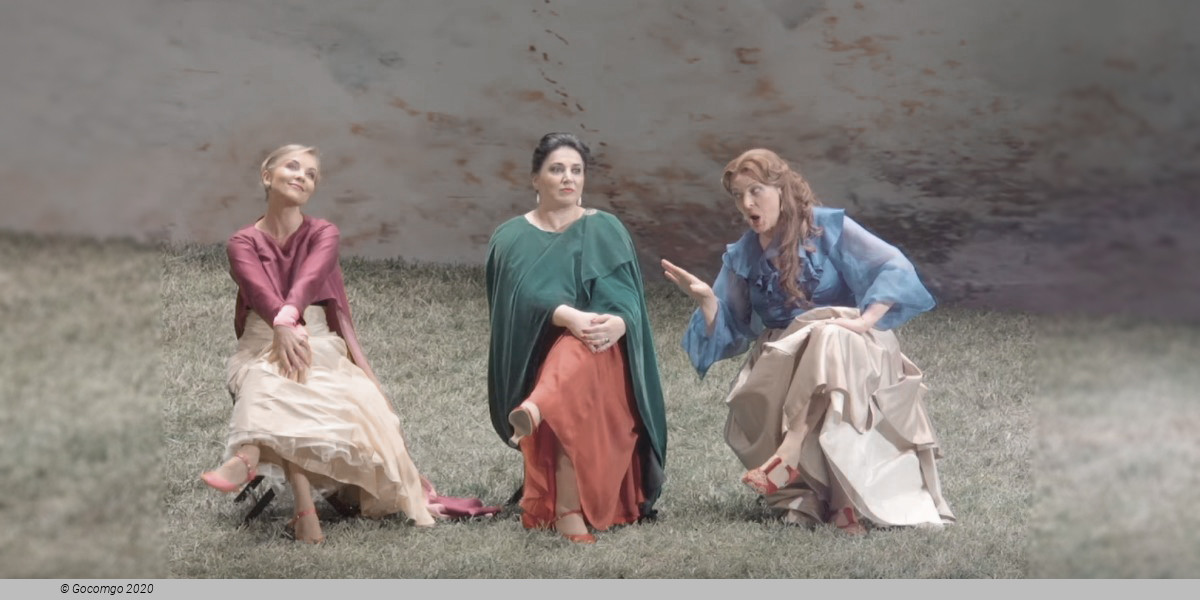
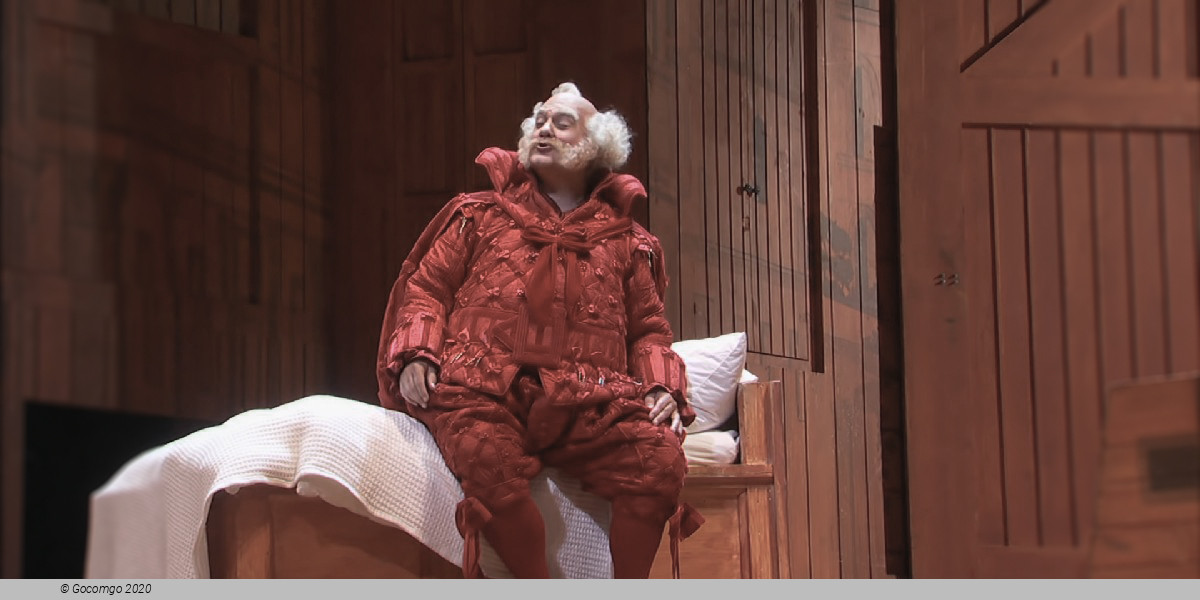
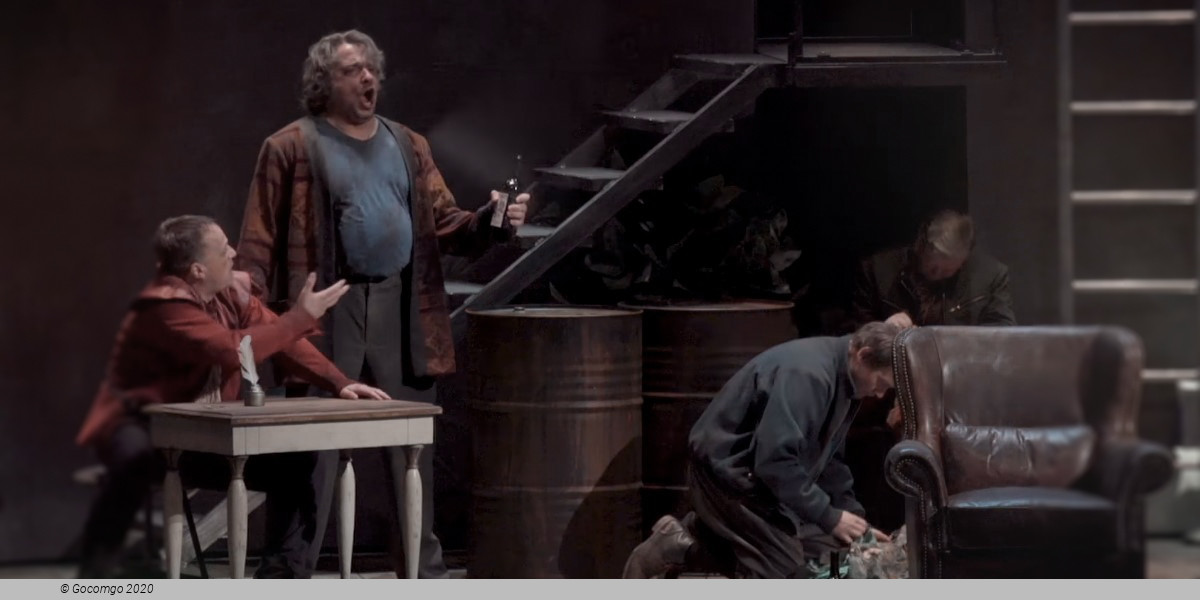
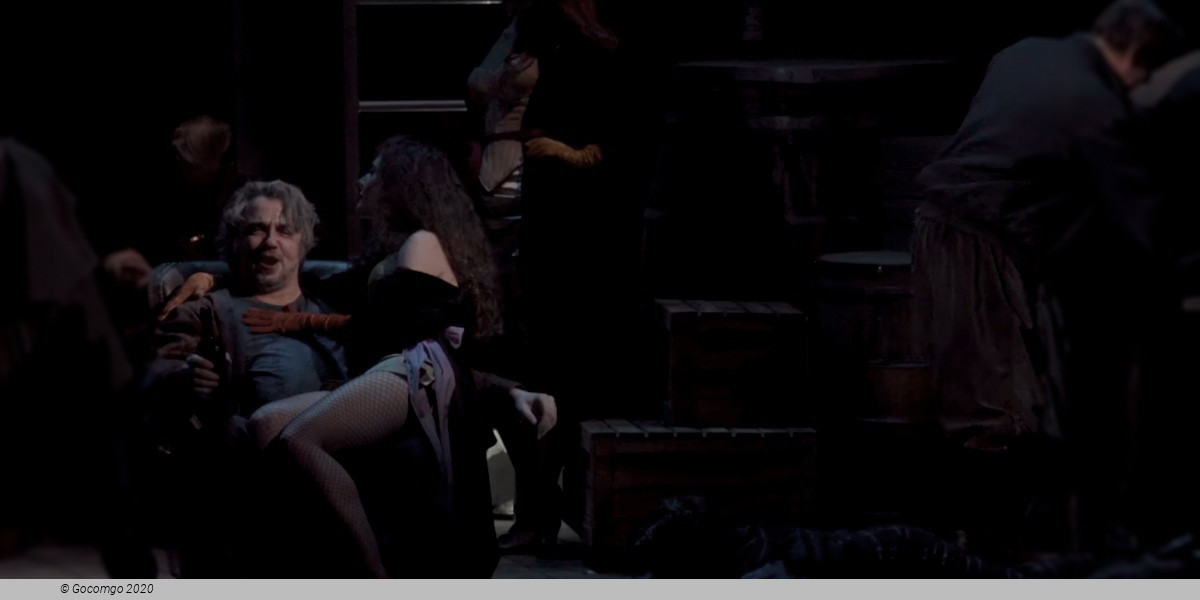
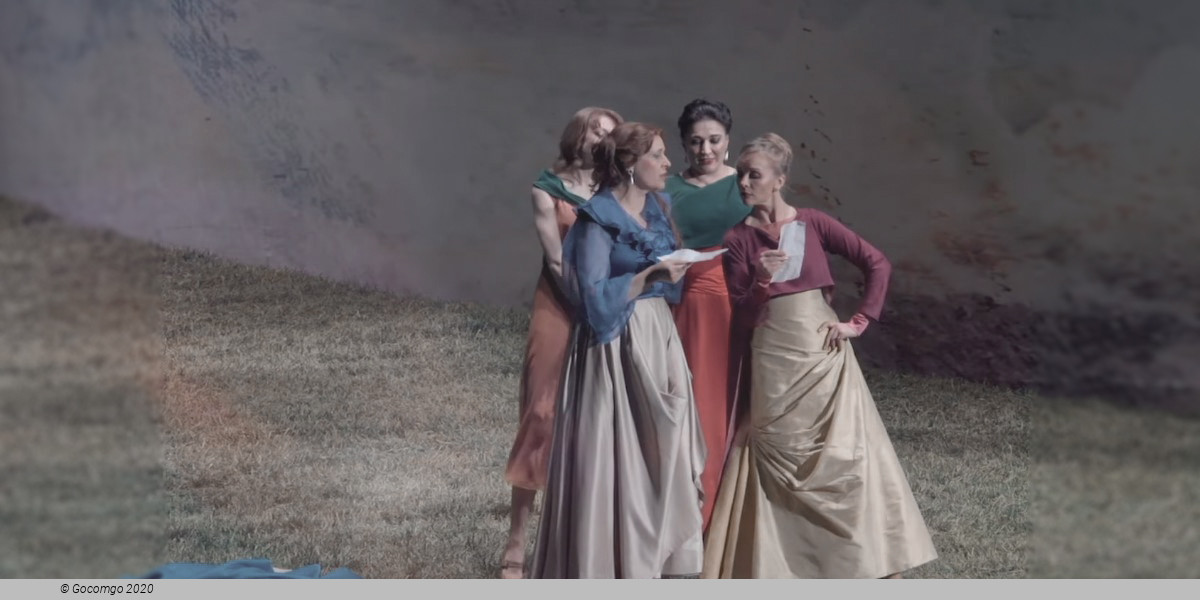
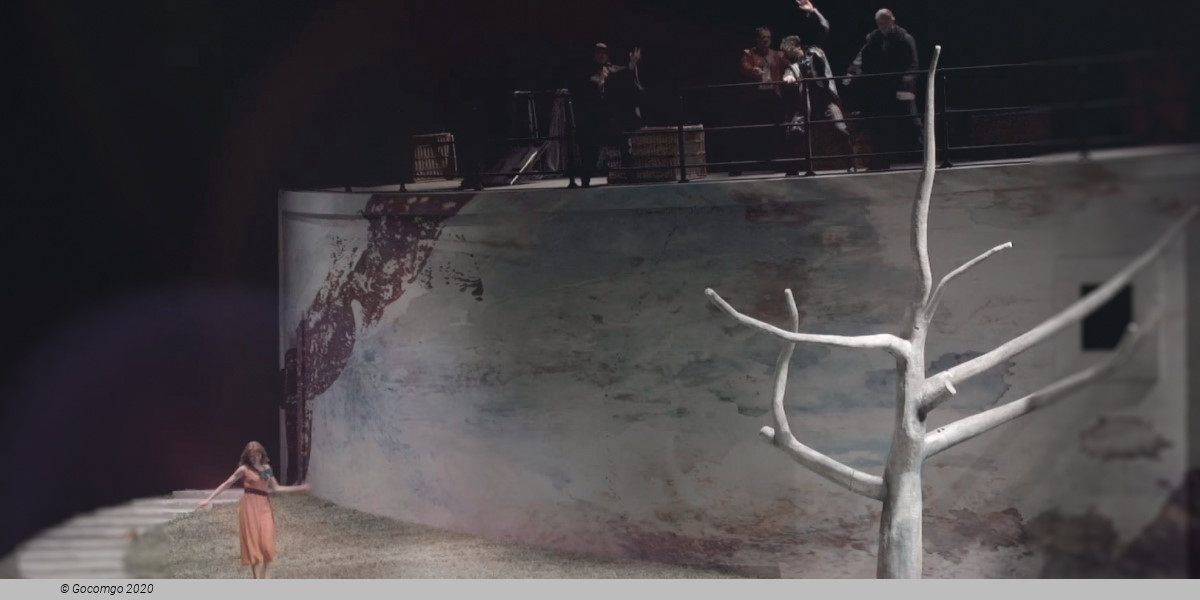
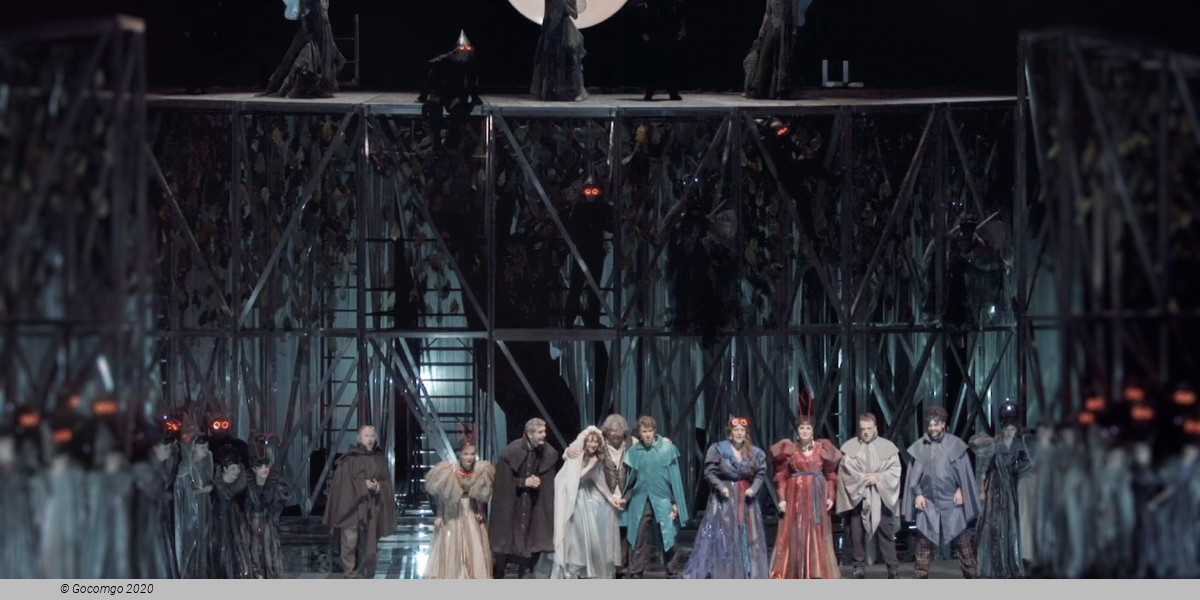
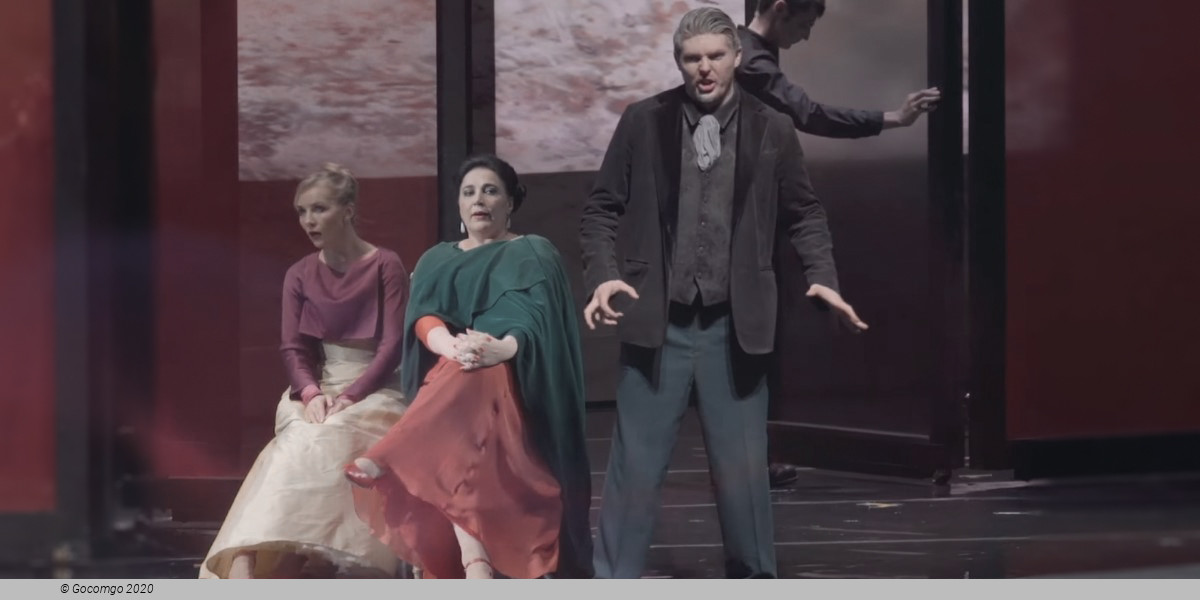
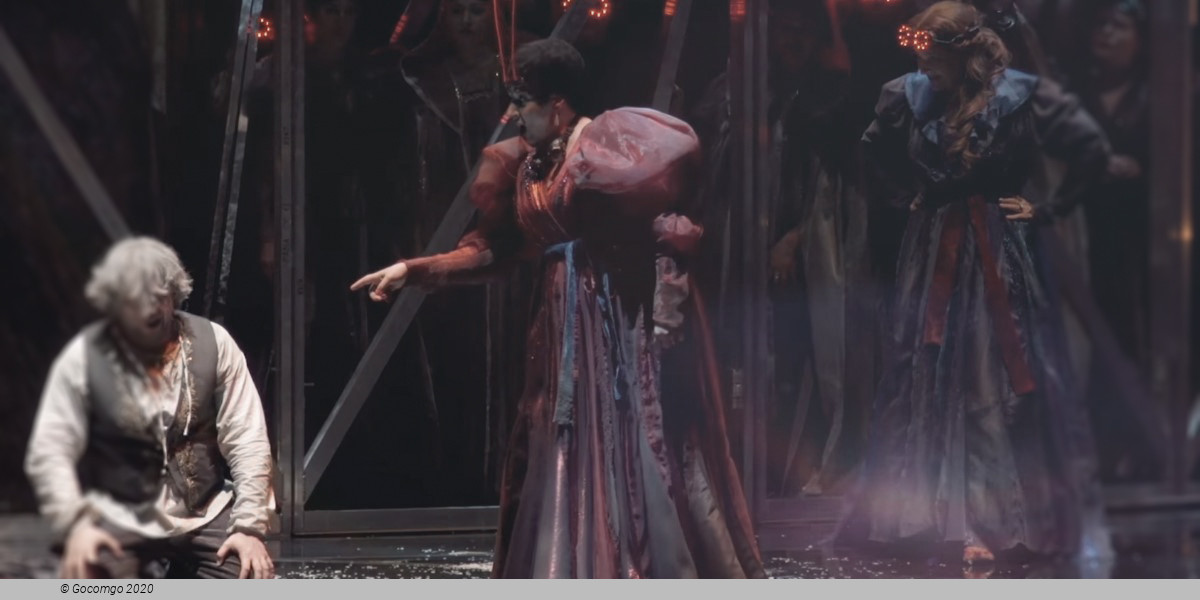
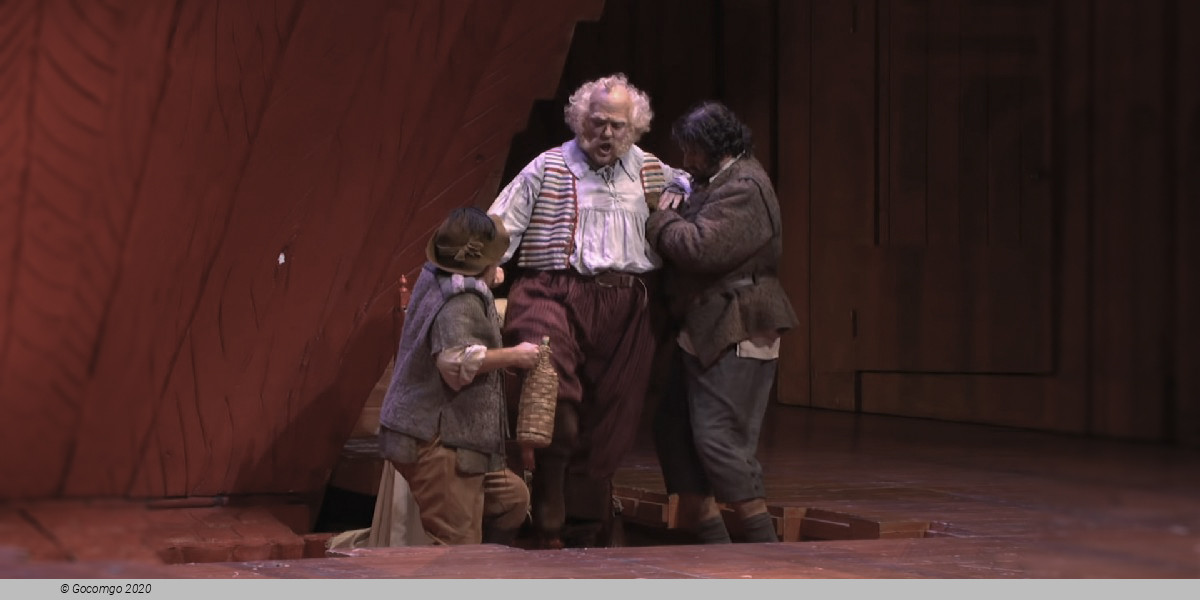
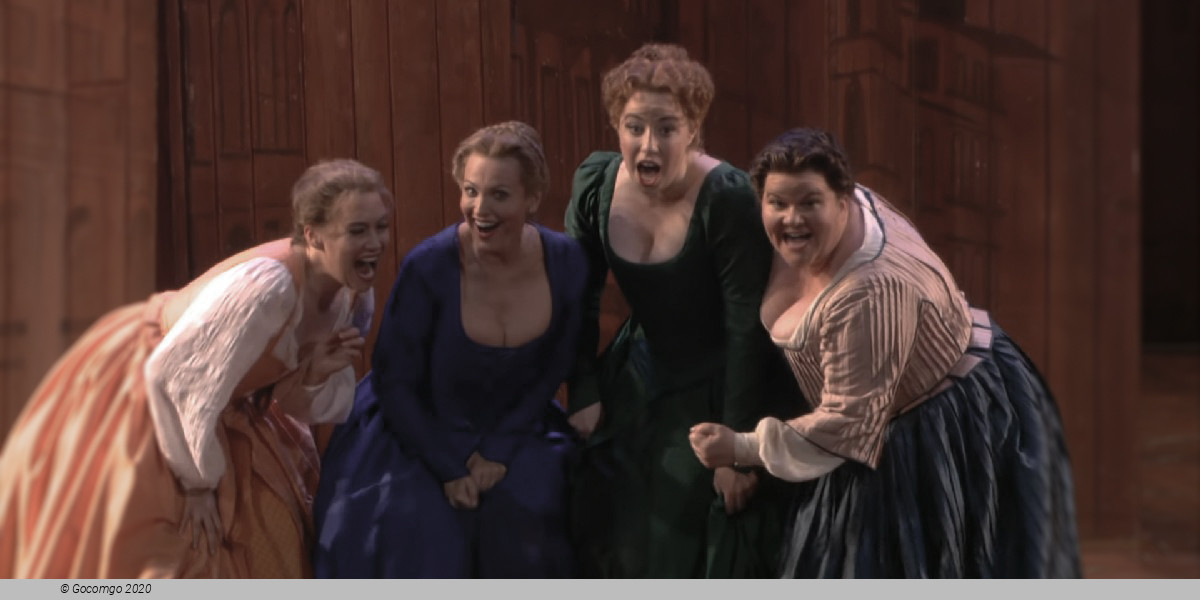
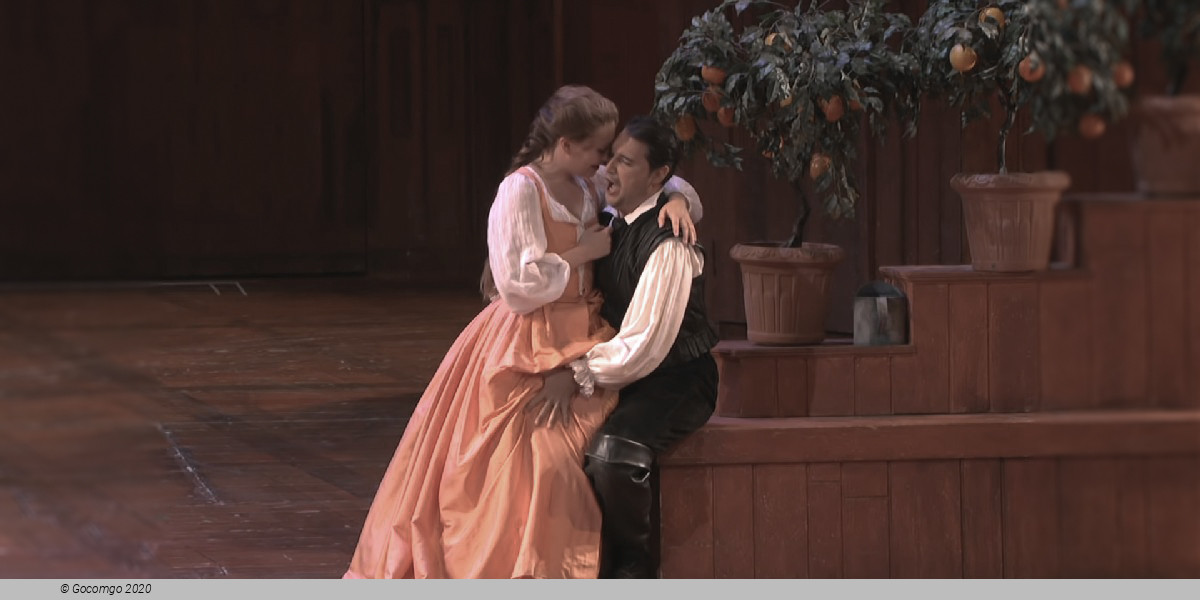
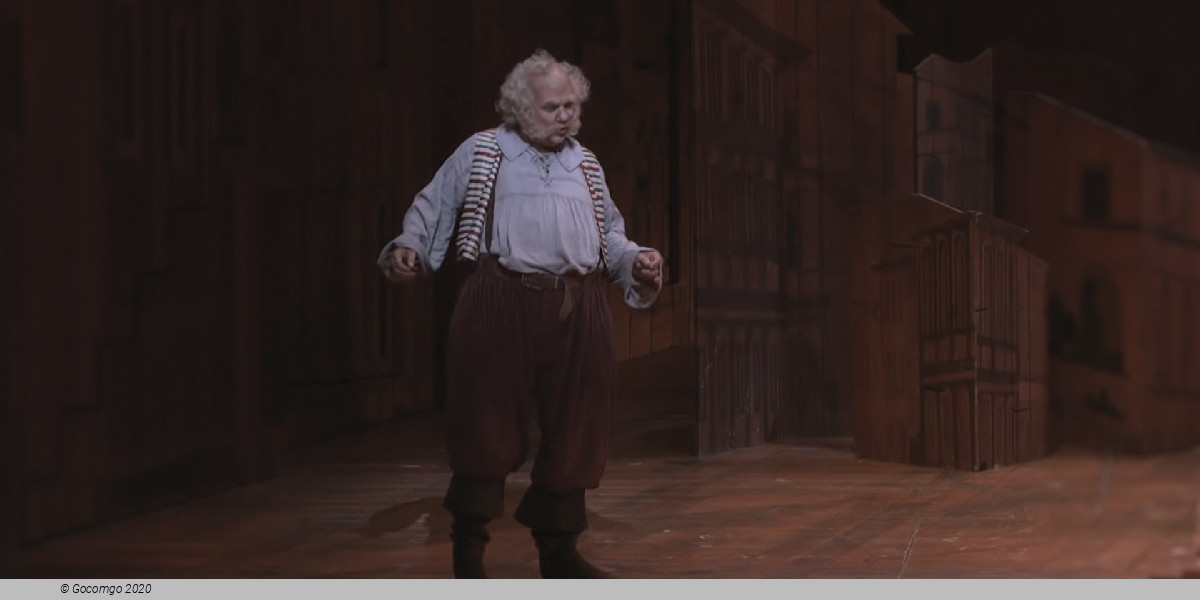
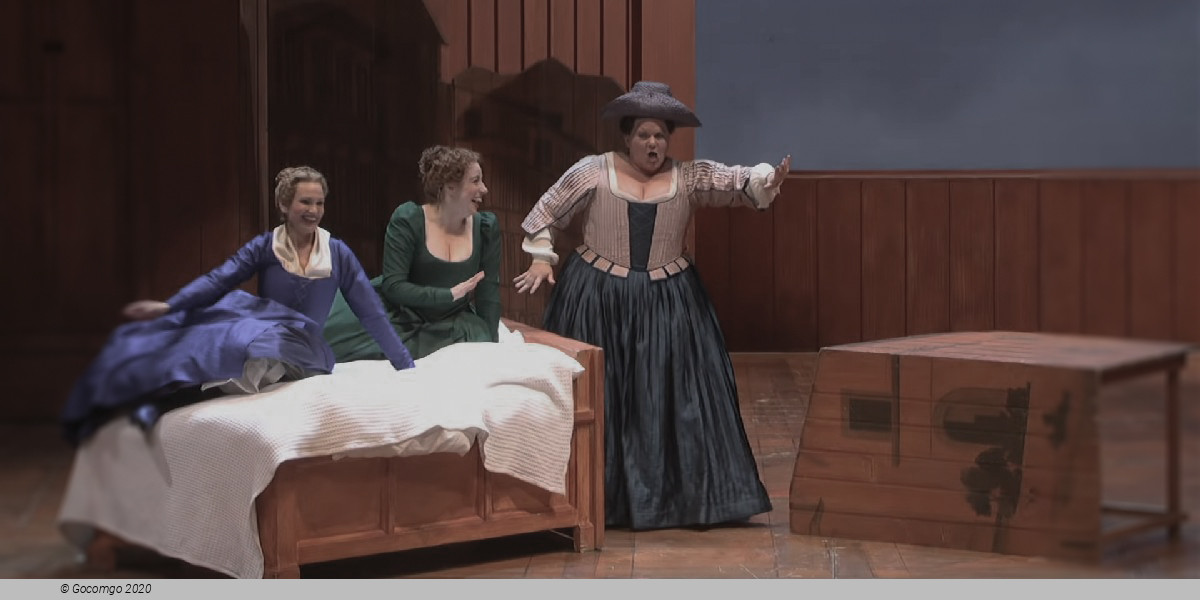
 1 Theatre Square
1 Theatre Square